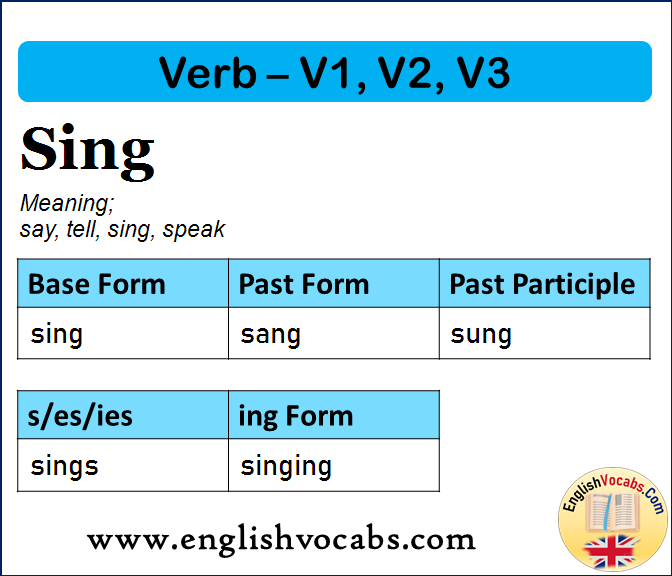
Spend Past Simple, Past Participle, V1 V2 V3 Form of Spend English Vocabs
In this section, we will cover the different forms of the past tense of 'sing.'. The past tense of 'sing' is 'sang.'. It is used to describe an action that happened in the past. For example: "Yesterday, I sang a song at the concert.". Here is a table that shows the different forms of the verb 'sing': Verb Form.

English Study Here
Irregular Verbs List Definition: To Sing Irregular verb: To Sing Verb conjugation: Sing - Sang - Sung Meaning of 'To Sing' To make music with your voice Conjugation of verb 'Sing' Irregular Verbs Following a Similar Pattern Verbs like: Subscribe to Ad-Free Browsing Enjoy a seamless learning experience without interruptions from advertisements.

Past Simple, Past Continuous, and Used to Easy Grammar YouTube
The past tenses of sing are sang and sung. Like many irregular verbs, sing 's past simple form is different from its past participle form. Sang is the past simple form. Here are some examples of what this looks like in a sentence: "I sing a sad song." (present) → "I sang a sad song." (past)
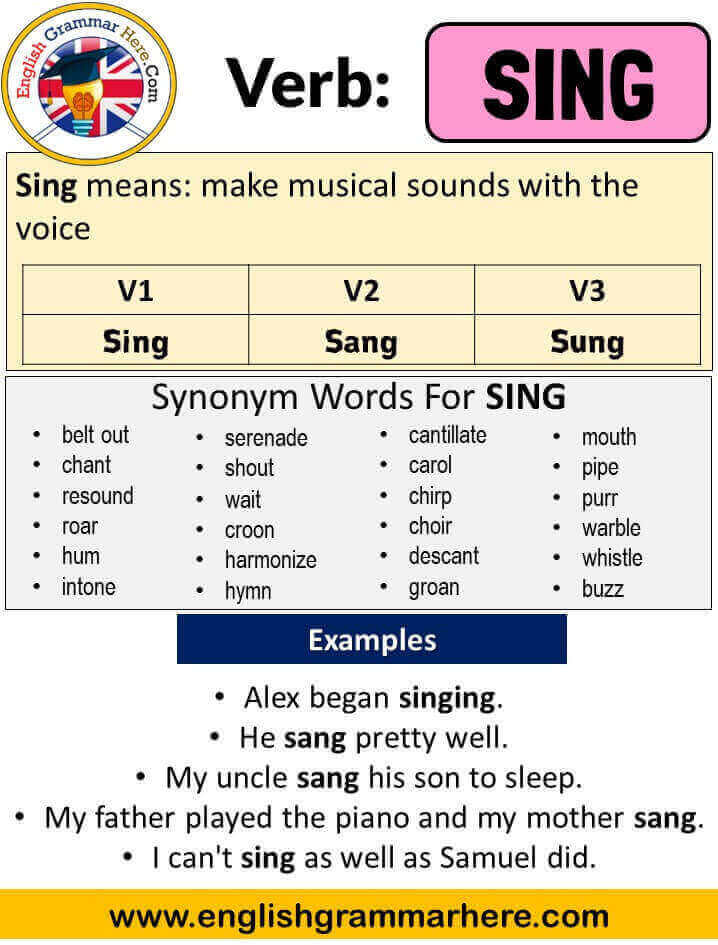
Sing Past Simple, Simple Past Tense of Sing Past Participle, V1 V2 V3
The past simple and the past participle of sing Conjugation of the verb sing: Base Form/Infinitive without 'to': sing Past Simple: sang Past Partciple: sung Present Partciple: singing Third Person Singular: sings Definition: To produce musical or harmonious sounds with one's voice. Example (s): She used to sing in the church choir.

Past Tense Of Begin Past Present Future Tense Examples David Simchi
Simple past english sang Past participle english sung More information Full conjugation of "to sing" Translations for "to sing" Full conjugation of "to sing" Indicative Present I sing you sing he/she/it sings we sing you sing they sing Present continuous I am singing you
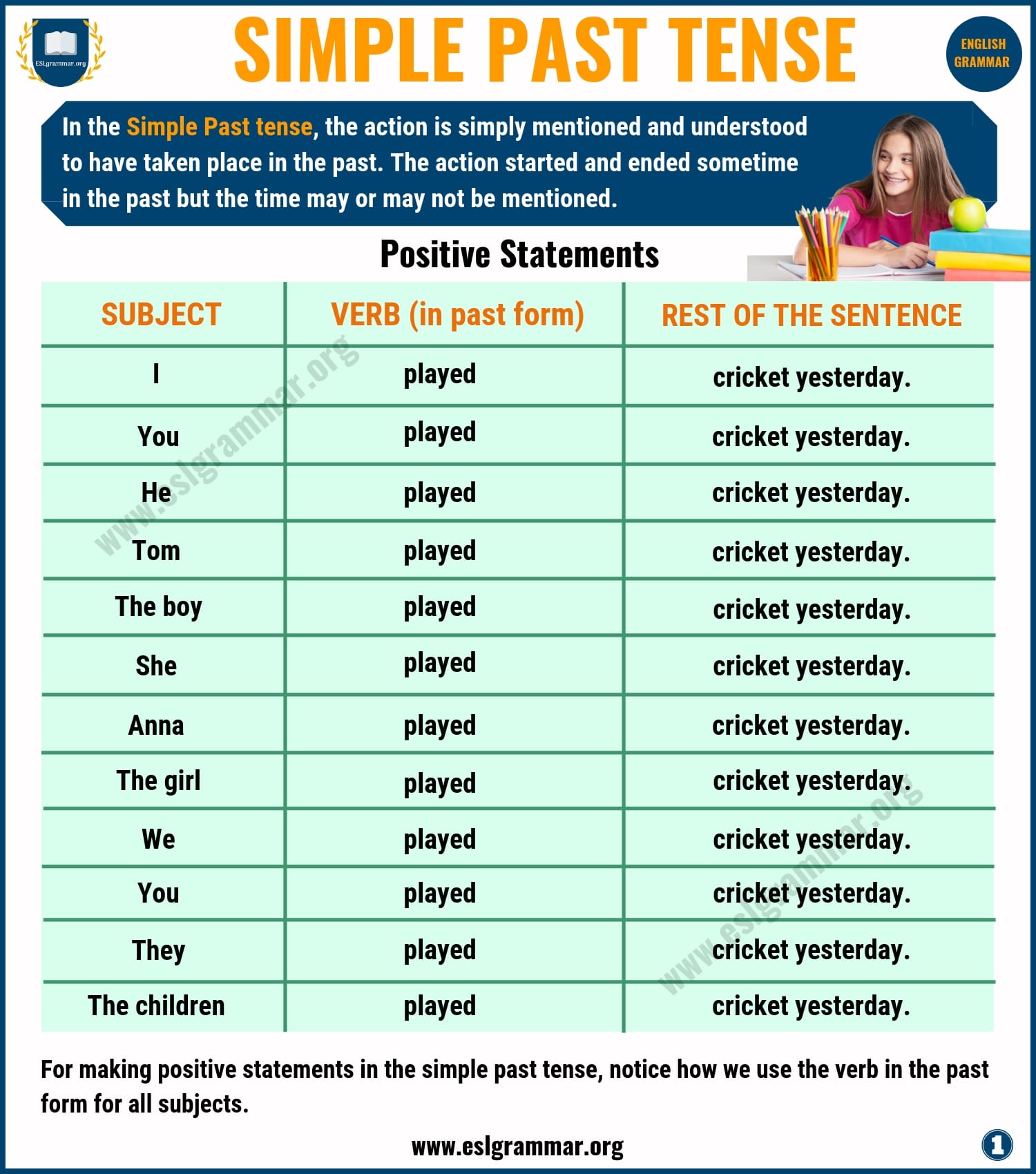
Verb use in past simple
There are two past conjugations of sing: sang in the simple past, and sung, which is the past participle form used with auxiliaries, (e.g., had in the past perfect and have in the present perfect tenses, respectively).

Sang Vs. Sung
Infinitive: to sing Gerund: singing Past participle: sung Simple past: sang Irregular forms Auxilliary verb Spelling change Use contractions. Positive Negative. Indicative. Positive Negative. Present. I sing I sing: you sing you sing: he/she/it sings he/she/it sings: we sing we sing: they sing they sing:
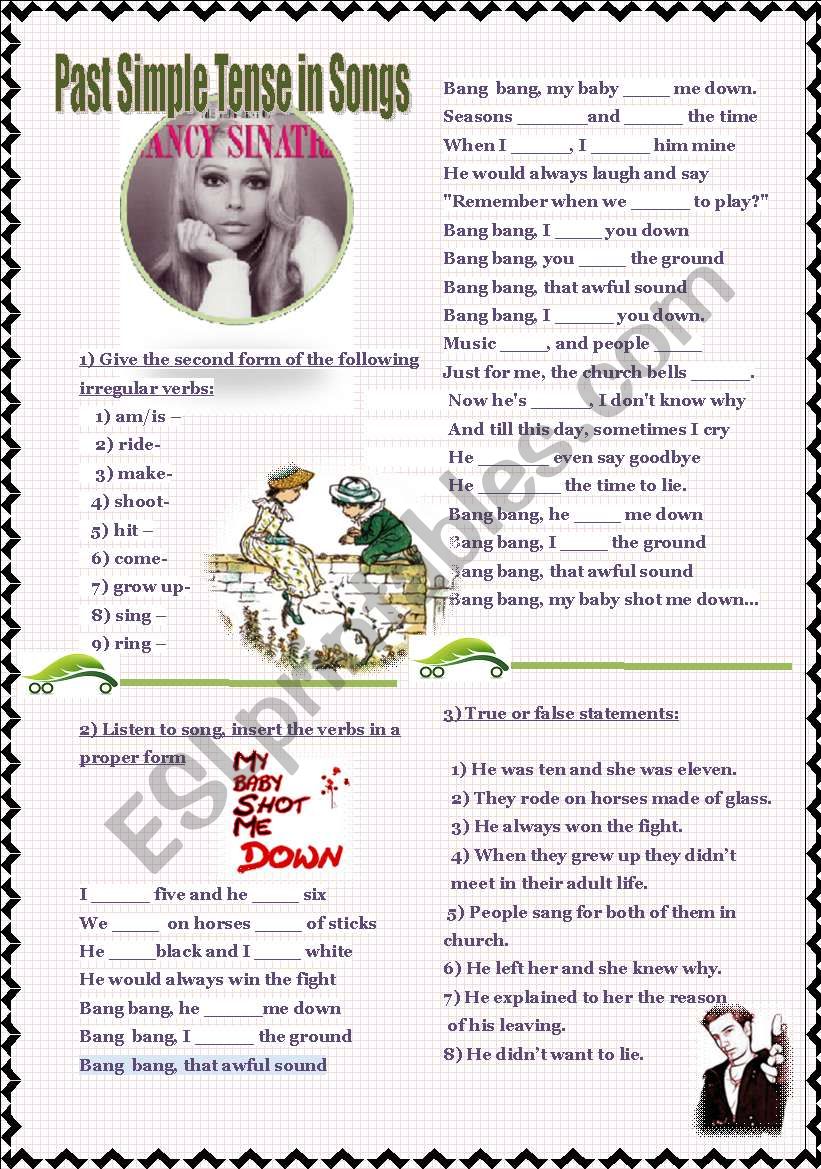
Past Simple in Songs ESL worksheet by savvinka
Past simple. Past participle. resing . resang resung . resung resungen . shut. sink. TOP 12 be buy do get give have make read say see take think . ⭐ Conjugation; ⭐ Conditional; ⭐ Subjunktiv. sing along sing away sing out sing up. Recent articles. Differences: past simple and past continuous; Past simple sentences;
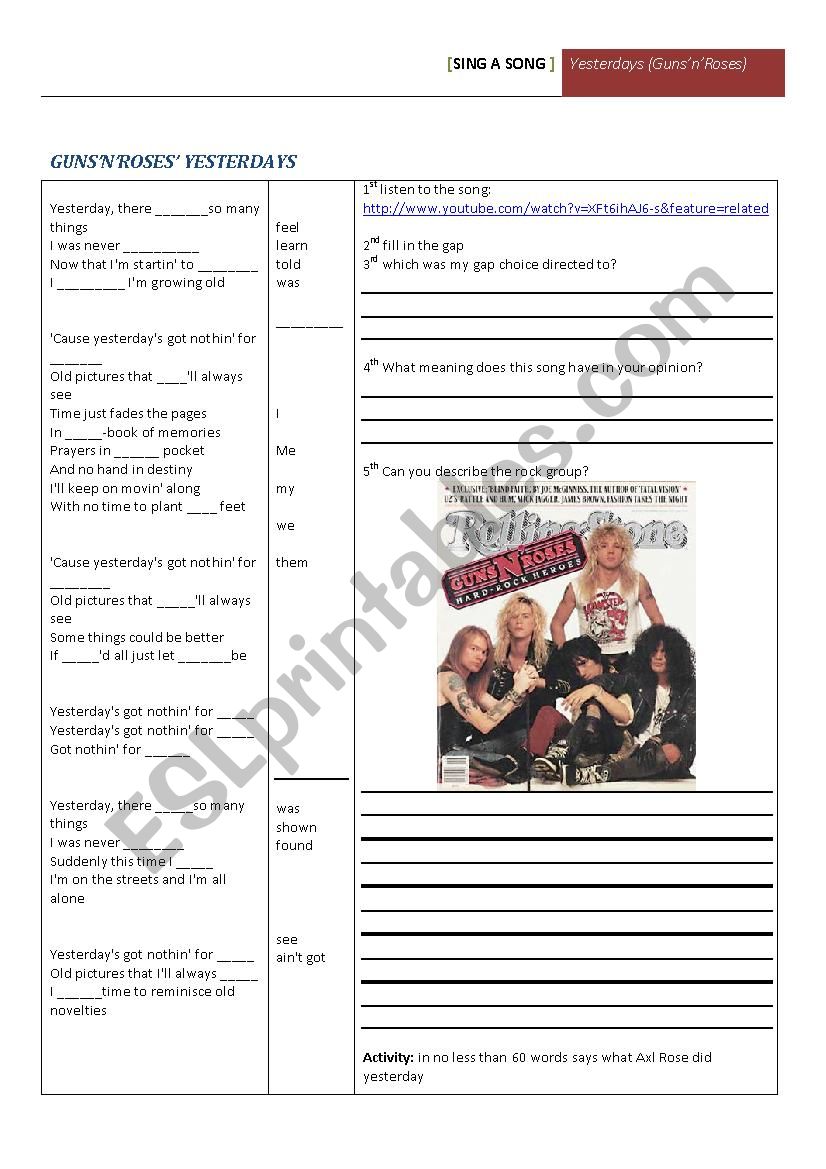
sing a song the simple past ESL worksheet by maddalena.letari
Sing Past Simple, Simple Past Tense of Sing Past Participle, V1 V2 V3 Form Of Sing Advertisements Sing means: make musical sounds with the voice V1 V2 V3 Form of Sing Synonym Words For SING belt out chant resound roar hum intone serenade shout wait croon harmonize hymn cantillate carol chirp choir descant groan mouth pipe purr warble whistle buzz
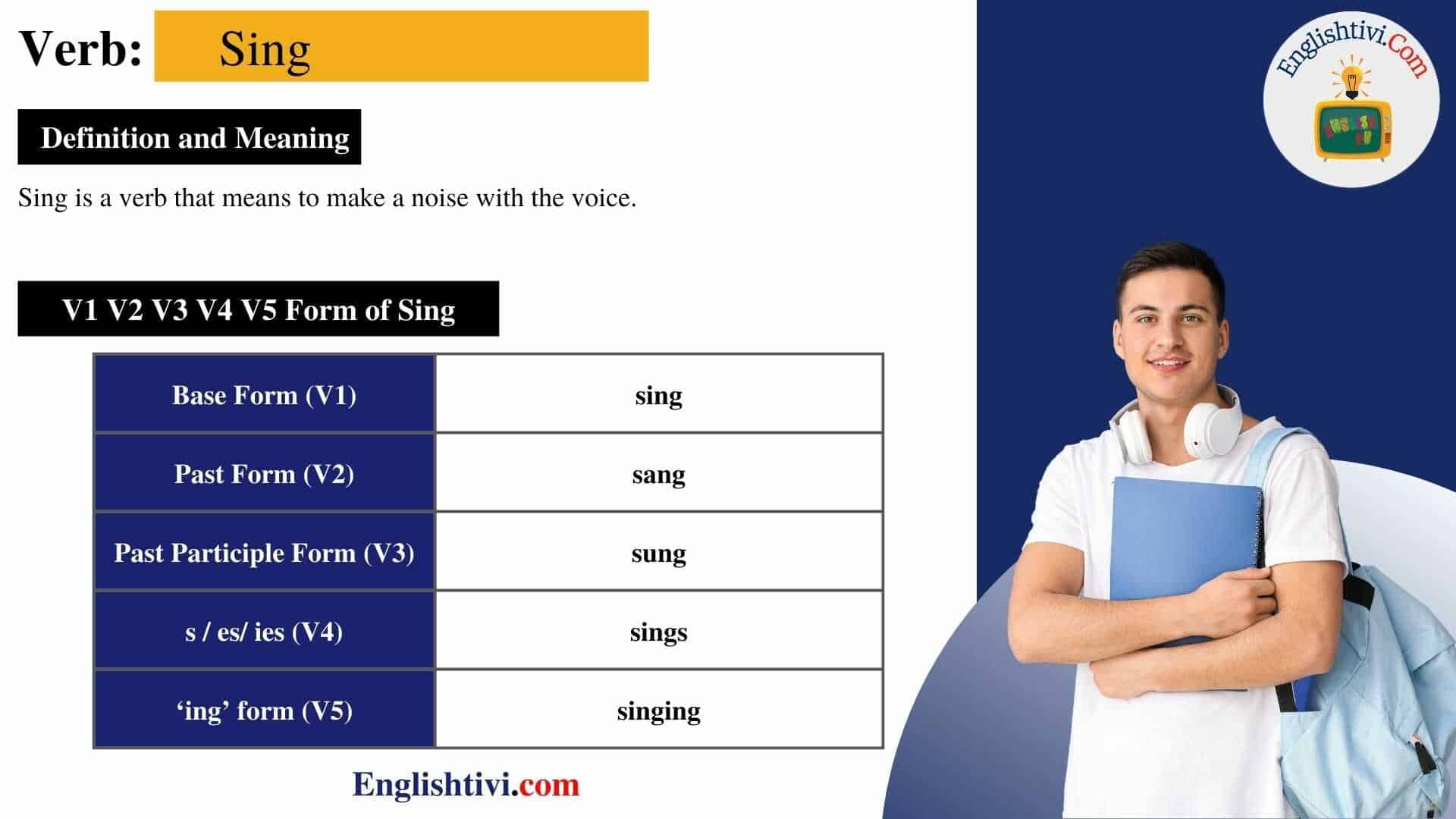
Sing V1 V2 V3 V4 V5 Base Form, Past Simple, Past Participle Form of
The Verb "Sing" in English Conjugation of "To Sing" The verb "sing" is an irregular verb. (This means that "sing" does not form its simple past tense or its past participle by adding "-ed" or "-d" to the base form.) The Five Forms of "To Sing" "To Sing" in All the Tenses

Sing past participle Archives EngDic
Simple Past Tense He/She/It sang. I sang. You/We/They sang. Past Continuous Tense He/She/It was singing. I was singing. You/We/They were singing. Past Perfect Tense He/She/It had sung or (archaic) sungen. I had sung or (archaic) sungen. You/We/They had sung or (archaic) sungen. Past Perfect Continuous Tense He/She/It had been singing.

Pin on A1 English
Sing in Present Perfect Tense. Singular. Plural. I have sung or (archaic) sungen. We have sung or (archaic) sungen. You have sung or (archaic) sungen. You have sung or (archaic) sungen. He/She/It has sung or (archaic) sungen. They have sung or (archaic) sungen.

Sing V1 V2 V3 V4 V5 , Past Tense, Past Participle Form of Sing
Past Simple - "I sang in the school choir." Past Perfect Simple - "It was only after the competition ended that I realised I had sung the wrong song." Past Perfect Continuous - "I had only been singing for 30 seconds when they buzzed me off the stage." The Present . Present Continuous - "I am singing a song." Present Simple - "I usually sing.

Sing Verb Forms Past Tense, Past Participle & V1V2V3 »
'sing' is the model of its conjugation. infinitive: present participle: past participle: (to) sing singing sung definition in Spanish in French in Italian Indicative Perfect tenses Continuous (progressive) and emphatic tenses Compound continuous (progressive) tenses Conditional Imperative Subjunctive
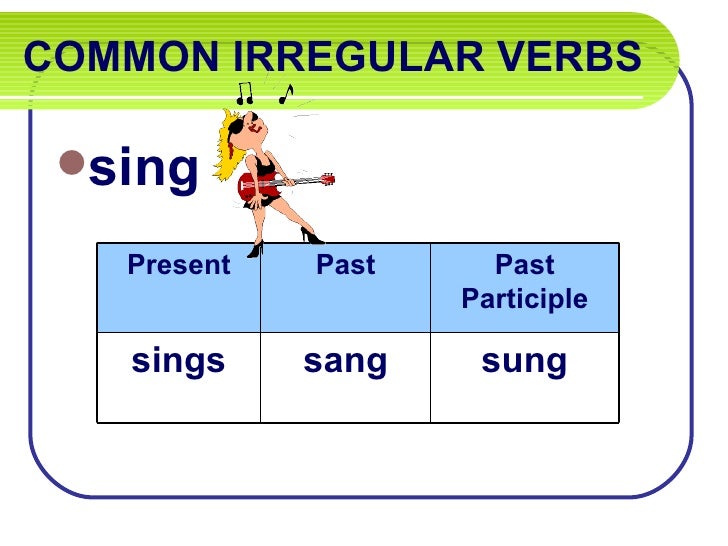
Verbs past patrticiple
Simple Future Tense I will/shall sing a song. He/She/It will sing a song. You/We/They will/shall sing a song. Present Continuous Tense I am singing a song. He/She/It is singing a song. You/We/They are singing a song. Past Continuous Tense I was singing a song. He/She/It was singing a song. You/We/They were singing a song. Future Continuous Tense

Be Past Tense and Past Participle AlissonhasGould
The infinitive of the word form is "sing." The present participle form is "singing." The past tense form is "sang" and past participle form is "sung." Understanding verb tenses. The general grammar rules that govern past tenses are as follows. The simple past tense form is created by adding a -ed or -d affix to the root word of.